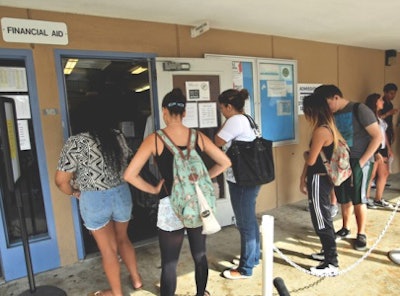
The report — titled “Better for Students: Simplifying the Federal Financial Aid Process” — is cast as one of a series of steps toward the foundation’s goal of eliminating the FAFSA altogether and instead relying upon existing income information provided through tax filing to determine financial aid eligibility.
The foundation predicts that an additional 2 million students will enroll in college if the three primary recommendations in its new report are adopted.
Those recommendations are to:
• Simplify the FAFSA by “sorting students according to the complexity of their financial situations and eliminating unnecessary application questions.” As the report states, “Three-quarters of all aid applicants do not have situations that would require them to file tax schedule documents (e.g., assets beyond home or retirement account, small business). These students should face the minimum number of questions.”
• Streamline the FAFSA by using tax data already provided by students to the IRS. This could be accomplished, the report says, by using the IRS Data Retrieval Tool, or DRT.
• “Stretch out the application window” by allowing students and families to use “prior-prior year” tax data, that is, tax data from a full year earlier instead of the year before. “This will allow students to apply for aid months earlier than they can now, giving them needed time to weigh their options and make informed decisions,” the report states.
In many ways, these recommendations are nothing new, as they’ve increasingly been bandied among thinktanks or even introduced in the form of legislation on Capitol Hill as of late. However, the report presents the recommendations in a more detailed form that foundation leaders believe will help spur congressional action in the near future.
“The purpose of the report is to influence and nudge and facilitate the conversation moving forward, so that some progress can be made in simplifying the FAFSA in a way that helps students in need,” Dan Greenstein, director of postsecondary success at the Bill & Melinda Gates Foundation, said during a press call Wednesday.
Greenstein criticized the current FAFSA as “enormously complicated” because “it consists of more than a hundred questions, 30 or more of which are answered by about 1 percent of the applicants.”
“The complexity creates a barrier to its completion,” Greenstein said, adding that about two million students don’t complete the FAFSA each year because of its complexity.
Even if only half those students were to complete college, Greenstein said it would make a “significant contribution” toward filling a projected shortfall in the year 2025 of 11 million individuals with postsecondary credentials needed to fill jobs that require postsecondary education.
Greenstein further described the FAFSA as “redundant on a variety of levels” because it requires students to provide information that they must also provide to colleges to which they are applying.
“This information is also available already with the IRS,” Greenstein said.
The FAFSA also creates a third problem related to timing, he said, because students fill it out in January or February of the year they are going to college, and subsequently are notified of their aid eligibility and how much they will be expected to pay in February or March of the year that they start college.
“Which means they’re racing to make decisions about what college to attend,” Greenstein said.
It would be better for students to be able to rely on tax data from the year before last instead of last year — as the current form requires — so that students have more time to choose a college that is a good fit.
“Evidence suggests students that are able to choose the right college for themselves are much more able to complete their degree,” Greenstein said.
Kim Cook, executive director of the National College Access Network, a nonprofit that serves college-access organizations, said the “prospects are strong” for movement on the Gates Foundation’s recommendations this year. NCAN is a Gates Foundation grantee that is working with the foundation on its Reimagining Aid Design and Delivery project.
“We’re not talking about ‘if’ anymore,” Cook said. “We’re talking about ‘how.’”
Jamaal Abdul-Alim can be reached at [email protected] or follow him on Twitter @dcwriter360.















